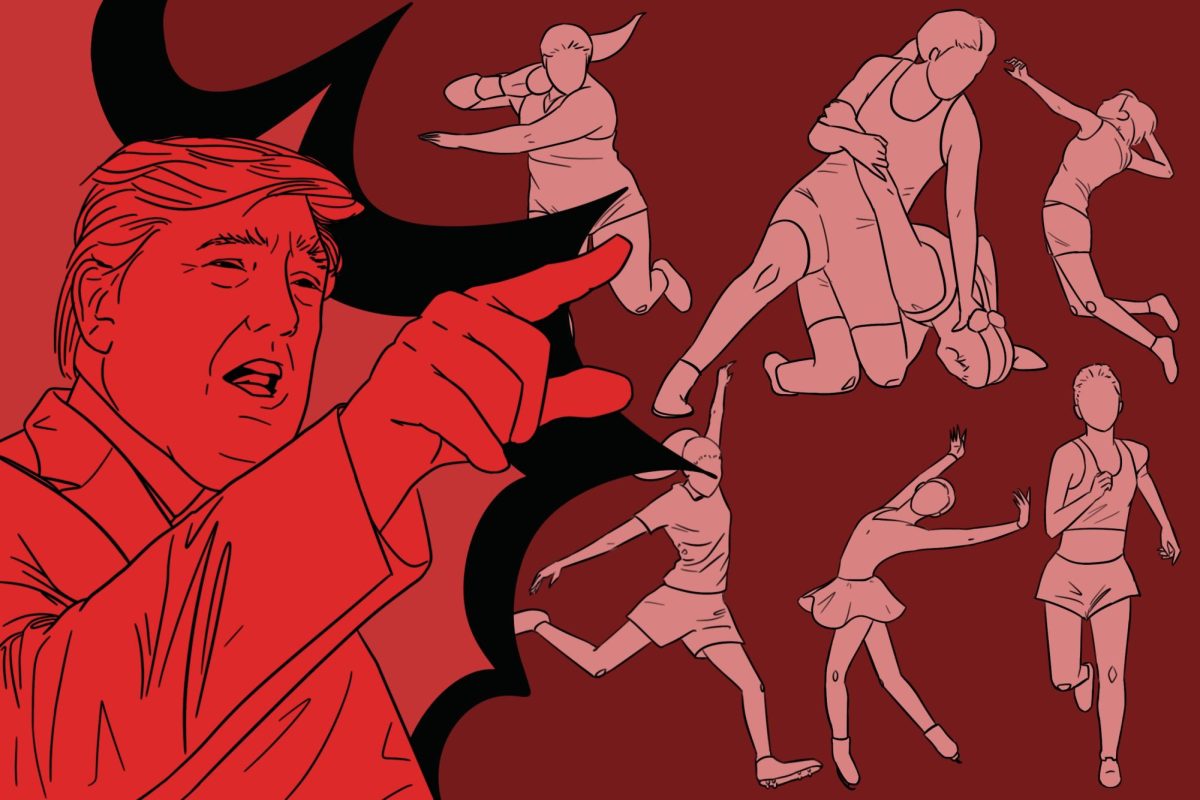Just hours after entering the White House, President Donald Trump doubled down on one of the social issues that helped him win the 2024 presidential election: keeping “men out of women’s sports.” It’s an issue that affects less than 10 student-athletes in the NCAA, yet an executive order targeting transgender people was one of many signed by the president on Inauguration Day.
The NCAA has yet to alter its inclusion policies in the wake of Trump’s repeated threats. NYU Athletics’ policy on trans athletes is entirely in line with those of the NCAA, which mandates routine testosterone level tests for trans athletes, allowing them to compete in line with their gender identity.
Senior Bryce Chan, captain of the NYU women’s soccer team and president of the LGBTQ+ Affinity Group, notes that she only knows of a few athletes who don’t use the same pronouns as their given sex, and that debates over trans athletes are uncommon at NYU.
“A dialogue about trans athletes has come up on our team before,” Chan said. “Michele Canning, the assistant athletic director and former coach of our team, provided super helpful resources about trans athletes in collegiate sports. It is definitely something we can all strive to learn more about.”
Chris Mosier, NYU alum and Hall of Fame triathlete, became the first openly trans man to represent Team USA internationally in 2015. Since transitioning in 2010, Mosier has dedicated his life to standing at the forefront of LGBTQ+ rights. In 2015, he pushed for trans athletes to be allowed to compete without gender reassignment surgery. Mosier claims the “lightning rod” of restricting transgender individuals in sport to be fairly recent — used as more of a political and social media campaign tool than anything else.
“Transgender athletes have been participating in sports for decades without problem,” Mosier said in an interview with WSN. “It’s only now that it’s a political issue that it has become a focal point. Republicans spent over $200 million in the last election attacking transgender people, and Trump has already made good on his promises to target, discriminate against and harm the trans community.”
The executive order Trump signed Jan. 20 is titled Defending Women From Gender Ideology Extremism And Restoring Biological Truth To The Federal Government. The order asserts gender as equivalent to sex, aiming to erase trans identity from government identifications such as driver’s licenses or passports. The House of Representatives just passed a bill, the Protection of Women and Girls in Sports Act, intended to ban transgender women from women’s sports in their entirety.
At NYU, the sole resource for queer athletes is accessible through NYU Athletics’ UltraViolet, the mental health hub for student-athletes. The site has a one-pager titled “You Belong,” linking the current NCAA policy on transgender athletes in sports, but students say it isn’t enough.
Additionally, Trans@NYU — NYU’s only visible resource for transgender students — is a webpage through the LGBTQ+ center that consolidates classroom and university tools. Both Trans@NYU and NYU Athletics did not respond to WSN’s requests for comment on the possibility of policy change.
“This is an important time for allies of transgender people to speak up,” Mosier said. “It feels incredibly overwhelming and scary to be a transgender person in the United States right now. When trans people and transgender athletes see support from their coaches, teammates, administrators and others, it can help us better navigate the hostility that some people have towards our community.”
Last Friday, Trump reversed former President Joe Biden’s Title IX rewrite, which included protection from discrimination against gender identity and sexual orientation, and reverted back to a strict binary definition of gender, getting rid of Biden’s protections and changing the way sexual assault cases are dealt with on college campuses.
“There are more pressing issues in this country than worrying about NCAA athletes playing their sport,” Chan said. “It is truly saddening to witness these types of identity-harming policies raised under the guise of ‘protection’ or ‘authenticity.’ The truth is that it’s just transphobia.”
It’s important for athletic institutions to confirm or create their own protocol in order to protect their LGBTQ+ and trans student-athletes, and to begin facilitating discussions within their locker rooms, weight rooms, courts, fields and elsewhere.
“Transgender people have been a part of every aspect of life since our country was founded, and we will continue to exist long after this administration is over,” Mosier said. “No one should have to choose between being who they are and playing the sport they love — they should be able to do both.”
Contact Levi at [email protected].


























































































































































